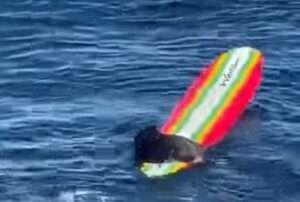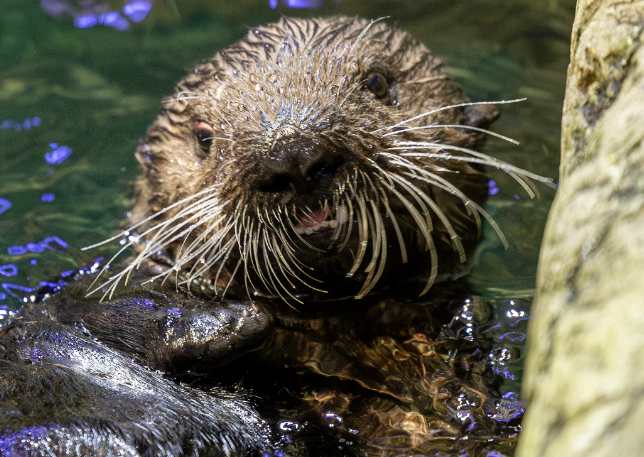
Santa Cruz, Calif. – The U.S. Fish and Wildlife Service (Service) and California Department of Fish and Wildlife (CDFW) are responding to reports of a 5-year-old female southern sea otter exhibiting concerning and unusual behaviors in Santa Cruz, California, including repeatedly approaching surfers and kayakers recreating in the area. Sea otters are naturally wary of people, but this individual has been aggressively approaching people and biting surfboards.
Upon capture, the sea otter will undergo a health assessment and eventually be rehomed in a zoo or aquarium.
Due to the potential public safety risk, a team from CDFW and the Monterey Bay Aquarium (Aquarium) trained in the capture and handling of sea otters has attempted capture of the sea otter when conditions have been favorable since July 2, 2023. Standard methods for capturing healthy wild sea otters have been unusable or ineffective so far due poor underwater visibility, the sea otter’s wariness of nets from previous capture attempts, and the sea otter’s behavioral patterns varying from day to day. Scientists suggest successful capture may take days or weeks given logistical considerations, the sea otter’s behavior, and shifting environmental conditions.
“The usual method for safely capturing healthy, wild sea otters is a clandestine underwater approach,” according to Colleen Young, an environmental scientist and sea otter biologist with CDFW. “In this case, however, the water has generally been too murky for us to see the animal from below. We are adapting other capture methods to this situation but must ensure the safety of both the sea otter and the people attempting capture, which has limited our options and opportunities.”
The sea otter is tagged with a radio transmitter and is being actively monitored by wildlife biologists. The Service authorized the capture of the sea otter after recommending hazing techniques, which were only temporarily effective.
“The goal is the safe capture of this female sea otter to remove the potential public safety risk while also recognizing and acknowledging the important role sea otters play in coastal ecosystems along the Central California coast,” said Lilian Carswell, Southern Sea Otter Recovery and Marine Conservation Coordinator with the U.S. Fish and Wildlife Service. “While this sea otter’s behavior is highly unusual, this situation amplifies the importance of always keeping a safe distance from all wildlife and not encouraging interactions, such as feeding, that may put an animal or yourself at risk.”
Due to her repeated aggressive behavior and potential public safety risk, upon capture the sea otter will be transported to the Monterey Bay Aquarium, where she will be examined by experienced veterinary staff. The Service, CDFW, and the Aquarium will work with the Association of Zoos and Aquariums (AZA) to find her a long-term home in a zoo or aquarium. Euthanasia and other lethal methods are not under consideration.
“Although this otter was born in an animal care facility, she was raised by her mother with minimal human contact,” said Jess Fujii, Sea Otter Program Manager with Monterey Bay Aquarium. “When she was released, she was monitored by wildlife biologists. This otter behaved like a typical otter in the wild for over a year before interactions with people began.”
This sea otter exhibited similar unusual behavior in the Santa Cruz area in September 2022, at which time CDFW and Monterey Bay Aquarium staff successfully hazed her, preventing further incident throughout the winter. There have been no reported interactions with people by this sea otter while at her overwintering site.
Fujii added, “While the exact cause for this sea otter’s behavior is unknown, aggressive behavior in female southern sea otters may be associated with hormonal surges or due to being fed by humans.”
Wildlife officials urge kayakers, surfers, and others recreating in the area to avoid approaching sea otters or encouraging any interactions with wildlife. If you see a sea otter near you, leave the immediate area.
To report a human-sea otter interaction, call the Monterey Bay Aquarium at (831) 648-4840.
[content id=”79272″]





